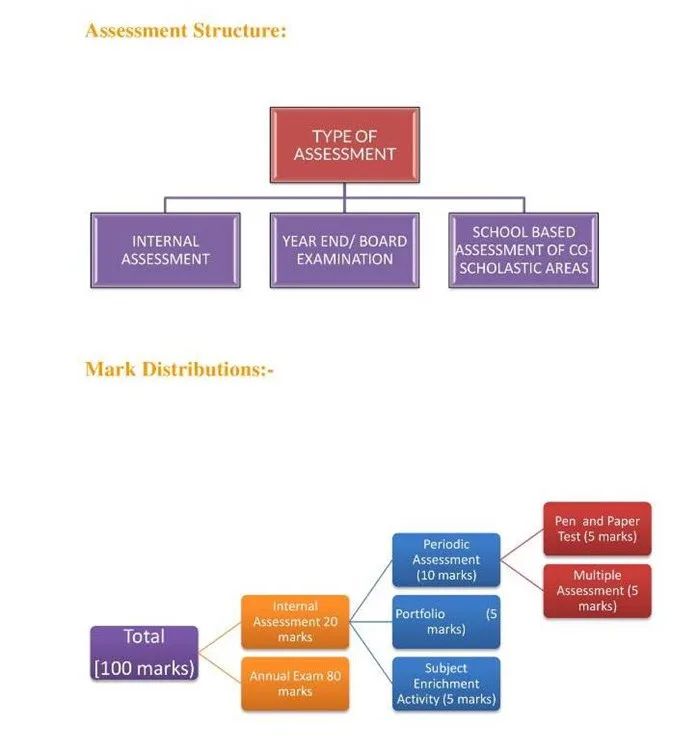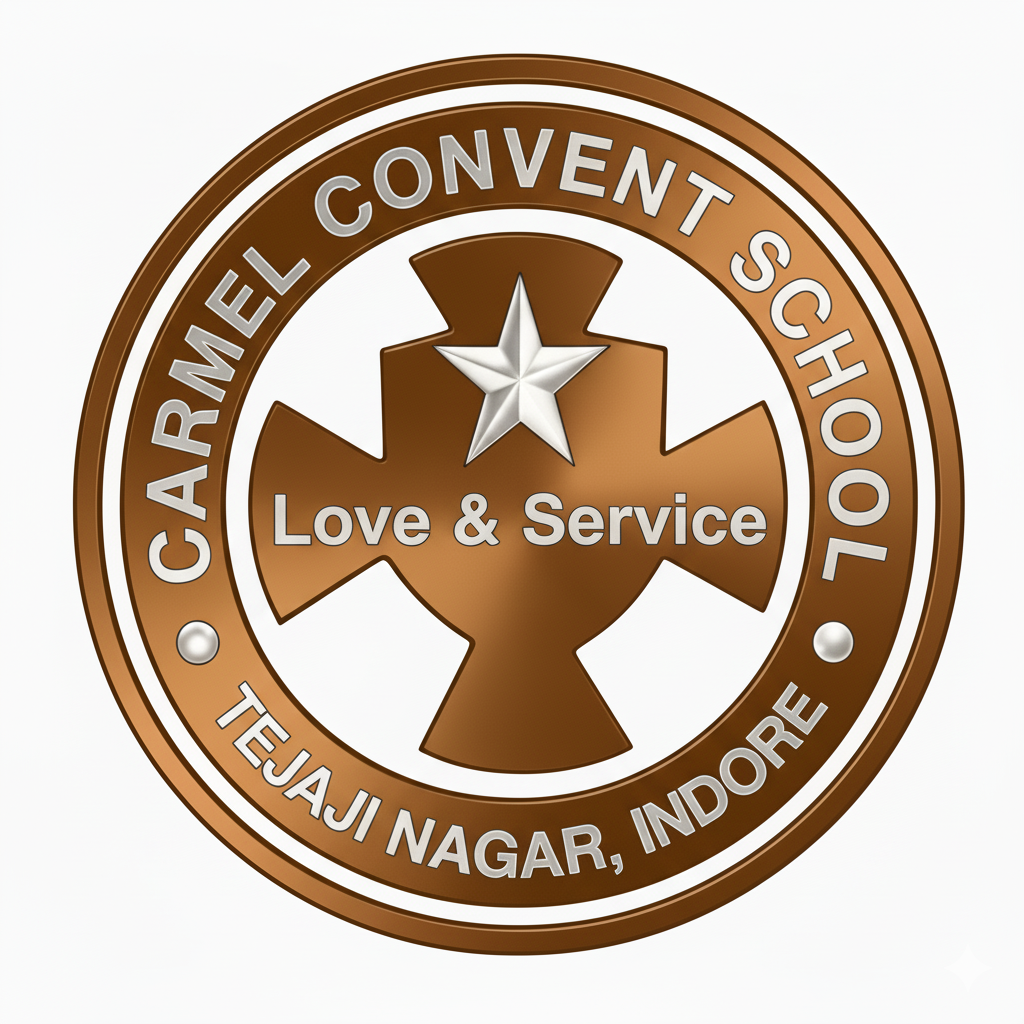CURRICULUM
Carmel Convent Sr. Sec. School, Tejaji Nagar, Indore has taken the challenge to enhance and acquaint the learners to understand the new perspective of education by to meet the challenges of the present era by developing a world view in every field of education for this dynamic generation. We are making ceaseless efforts to develop the skills needed by developing support materials and literature for curriculum transaction. Attempts are made to test the global comprehension and exploration beyond the set text. The whole module has been reset and a new format and type face is used to stimulate the imagination of students and create an incentive to create expression.
Throughout the session, emphasis is placed upon :
Valuing ones experience
Observing and investigating
Aiming to instruct, convince and to persuade through careful planning and clear thinking.
Students and teachers measure the degrees of progress made through various assessments conducted from time to time and the results of which are entered on individual progress charts.
Students are taught to practice self-criticism which helps them in the valuable educative process through their self-criticism charts. Through this the child acquires the ability to learn and measure his progress by weighing his work against his own intention. The main motto of the school curriculum is to inculcate the human values, faith in God, love for fellow beings and the academic excellence to transform their mind with a greater vision to see this world with a positive outlook and hence always be a channel of love and morally upright human being, so that they can be an asset to this world at large.
COURSE CONTENT
The Courses and Evaluation system used in our institution is purely based on the latest scheme, norms and directives of CBSE namely Uniform system of Assessment. Students too get familiar with the new pattern, rubrics and new schemes introduced by the Board.
Examinations are conducted according to the Uniform System of Assessment and Examination. The whole academic session has altogether three Periodic Assessments, one Half Yearly (Mid Term) and Yearly (Final) Assessment used as a tool to monitor the students progress in the scholastic areas. Under this, the students will be tested internally in the form of pen paper based on Board Syllabus. Different methods and approaches are adopted for defining the educational outcomes of the students studying at various levels.
KINDERGARTEN
As the pre-primary level is the foundational stage of the tiny tots, our main focus is to set their mind fear free by providing a secure environment through play-way method making the formal schooling interesting and entertaining with a perfect balance of Activity based learning, inculcating within each child the essence and meaning of love.
STD I -V
At the primary level we strive and focus on Co-Curricular Activities apart from the academic course, to develop good communication skills with a perfect blend of discipline and inculcating, moral values as the basic component within each child for their scholastic development.
STD VI -X
The middle schools and high School follow the NCERT curriculum through different methods and approaches and the school caters to the needs of each child infusing them with knowledge and understanding for enriching their overall personality by promoting the reading habits with a purpose to create independent thinking not. This not only helps to create their own knowledge but also critically interpret, analyze and evaluate everything with objectivity and fairness.

Part 1 : Scholastic Areas
The assessment structure and examination system is purely based on the latest scheme, norms and directives of CBSE i.e. Uniform System of Assessment which comprises of two terms i.e. Term-1 and 2 as explained below:
Mark Distributions:-
Periodic Test [5 marks]
- 3 Periodic tests of 25 marks each to be conducted in the academic year.
- Average of the best 2 tests to be taken for final marks submission (converted to 5).
- Cumulative syllabus.
Multiple Assessment [5 marks]
- Quizzes, Oral Tests, Concept Maps, Exit Cards, Visual Expression etc.
Portfolio (5 marks)
- Classwork
- Peer assessment
- Self-assessment
- Reflections, narrations, journals
- Achievements of student in the subject
Subject Enrichment (5 marks)
Language -Effective speaking and listening skills.
Mathematics – Lab activities and Projects.
Science -Practical work.
Social Science -Map and Project work.
VOCATIONAL SUBJECT [For IX (2019-20)]
- Information Technology (402) under NSQF stream .
- Under Co- Scholastic activities student opting vocational subject shall be exempted from work education or pre-vocational activities.
- Total Marks: 100 (Theory -50 + Practical -50)
Introduction of two levels of Mathematics for AISSE 2020, onwards
- CBSE has introduced 2 levels:
- Mathematics -“ Standard, for existing level of examination
- Mathematics -“ Basic, for easier level of examination
- Standard level : For students who wish to opt for Mathematics at Sr. Sec. Level
- Basic Level : For students not keen to Peruse Mathematics at Sr. Sec. Level
- Syllabus, Class Room Teaching and Internal Assessment for both the level remain the same.
- Student to choose between the two levels of examination at the time of submission of LOC by school to the Board.
- Mathematics-Standard is to be passed at class X, for taking up Mathematics at Sr. Secondary level.
- A student qualifying Mathematics-Basic has the option to appear in Mathematics-Standard at the time of compartment exam.
- There shall not be two levels of assessment / examination for Class IX
Grading Scale for Scholastic Areas for VI-IX
|
Grading Scale for Scholastic Areas (Classes VI-VIII) (School will award grades as per the following grading scale) |
Grading Scale for Scholastic Areas (Class-IX) (School will award grades as per the following grading scale) |
||
|
MARKS RANGE |
GRADE |
MARKS RANGE |
GRADE |
|
91-100 |
A1 |
91-100 |
A1 |
|
81-90 |
A2 |
81-90 |
A2 |
|
71-80 |
B1 |
71-80 |
B1 |
|
61-70 |
B2 |
61-70 |
B2 |
|
51-60 |
C1 |
51-60 |
C1 |
|
41-50 |
C2 |
41-50 |
C2 |
|
33-40 |
D |
33-40 |
D |
|
32 & Below |
E (Needs improvement) |
32 & Below |
E (Failed) |
Part 2:Co-Scholastic Activities
For the holistic development of the student, co-curricular activities in the following areas will be carried out by the teachers and will be graded term-wise on a 3-point grading scale (A=Outstanding, B=Very Good and C=Fair).The aspect of regularity, sincere participation, output and teamwork be the generic criteria for grading in the following co-scholastic activities:
-
- Work Education – Work Education refers to skill-based activities resulting in goods or services useful to the community
- Art Education (Visual & Performing Art)
- Health and Physical Education (Sports/Martial Arts/Yoga/NCC etc.)
Part 2:Co-Scholastic Activities
The students will also be assessed for the discipline which will be based on the factors like attendance, sincerity, behaviour, values, tidiness, respectfulness for rules and regulations, attitude towards society, nation and others. Grading on Discipline will be done term-wise on a 3-point grading scale (A=Outstanding, B=Very Good and C=Fair)
STD XI -XII
The senior classes in the + 2 level, the students are free to choose any of the four streams i.e., PCM, PCB , Commerce amd Humanities with optional subjects of Hindi, Sanskrit, Computer Science, Physical Education, Painting, Economics following the prescribed text books published by the NCERT, creating learners for the 21st century through thoughtful studies and aiming at a mastery of their techniques by continuous practice and examples through a practical approach and a minimum of theory and rules.
School provides various opportunities to discover, develop and deploy their talents through various competitions, team work, assigning responsibilities, developing leadership qualities; generating values and empathy towards their fellow-beings through their daily life experience. Time bound study programme, workshops, seminars, educational tours help the students to face the daily challenges and to make a difference in their life.
